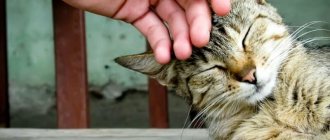Cats are famous hunters. Country cats enjoy catching mice, and house cats enthusiastically participate in games where you need to grab something. But what if the owner’s hands become the prey for the cat’s sharp teeth?
In this article we looked at why cats can bite their owner's hands. You will learn how to wean your cat from the bad habit of showing its teeth and how to recognize the animal’s readiness to bite you.
Cat psychology
Every fluffy and affectionate cat has the blood of a warlike hunter flowing in it. A prey that looms before your eyes will definitely awaken the hunting instinct in even the calmest cat. It’s good when this victim is a toy or a small rodent. It is much worse if the owner’s hands play such a role. But other aspects of cat psychology also influence the bad habit of biting.
Cats have a keen memory, and you could write a dissertation on the vindictiveness of furry cats. Therefore, your pet’s aggressive behavior is often associated with psychological trauma and unpleasant memories in the animal’s life. For example, if you adopted a cat from a shelter, its biography may contain sad facts. A cat that has been beaten by its previous owner will reflexively bite in an attempt to protect itself. Your hand reaching out to pet the cat may be perceived by the animal as a threat.
Your cat may perceive you as a threat.
Cats are also social animals that love attention. It may seem to you that you were bitten just like that, then put yourself in the place of the animal. It managed to meow, wag its tail displeasedly, and look at you with a bewitching gaze. And you don't react. And he has one last chance to remind him of his existence - to bite! After all, the owner will definitely notice her.
Personal boundaries in the lives of cats are also important. Some breeds are tolerant of children's attention, tail pulling, and loud laughter. But if there is no reaction to the cat’s signals of dissatisfaction, she can only defend herself in ways known to her.
Additional measures
Don’t forget about additional measures to combat cat scratches. These measures, in combination with educational measures, will help the owner more comfortably survive the cat’s weaning period.
Manicure
A cat manicure is a very important event for all cats living at home. It is done using a special tool - a nail cutter, which is selected individually in accordance with the breed, characteristics of the claw, the character and behavior of the animal itself.
This procedure is unpleasant and can be traumatic for the cat, so before starting the procedure you should carefully and more deeply familiarize yourself with this topic. If the breeder has any difficulties or concerns, he should contact a groomer or veterinarian.
Norm or pathology
A cat is a domesticated animal. Nature designed them as hunters, and genes sometimes make themselves felt. That's why they have sharp claws and thin teeth that can pierce the skin with lightning speed. It is normal for an animal to use your own hunting tools. But, of course, it is more convenient when a toy or small rodents, rather than the owner’s hands, become the treasured prey for a cat. Therefore, if you have adopted a stray cat, get ready: biting is natural for him. Lack of education and the habit of keeping your teeth to yourself will inevitably lead to bites.
If a cat has been raised since childhood as a gentle and neat pet, then aggression and regular bites on his part are abnormal.
the gray cat aggressive bites the hand
A sudden change in behavior may indicate illness. For example, something hurts your cat, and while stroking you touched the sore spot. The acute pain frightened him, and he reflexively defends himself and drives away the external irritant. If bites recur, take your pet to the vet.
Pet behavior
A properly trained cat will never immediately go on the attack.
You can notice by your pet's behavior when certain actions of yours displease him. You need to be very attentive to your pet, and then you will immediately learn to read his mood by his actions.
A mentally healthy cat will attack its owner only if he has gone beyond what is permitted. Before this, the cat will show by its behavior that it does not like the behavior of its owner.
If a cat twitches its ears, fur or tail , pushes away your hand or toy, the expression on its face changes, this all indicates that the animal is starting to get nervous. In this case, it is better to leave your pet behind so as not to get what he deserves.
Reasons for unexpected aggression
Unexpected cat aggression is such only for owners. Cats always have motives and if they could talk, they would have an argument for every bite. A cat may bite because it is tired. If a cat fell into the hands of children who endlessly pulled its tail, its patience could run out. Don't let children bully your pet. For cats, their personal boundaries and sense of freedom are important.
The causes of bites can also be harmful. Castration or sterilization will help. After these procedures, the animal becomes noticeably calmer.
Cats have an unpleasant character trait that should be taken into account in life together - vindictiveness. Did you give your pet a bath the day before the bite? Or maybe they yelled at him for stealing a chicken from the table?
Perhaps the cat is taking revenge on you for water procedures
But there are also less obvious reasons for cat revenge. Here your pet obediently lies on your lap and enjoys stroking. And then behind your back he sees another pet, with whom they had a conflict the day before. The cat begins to feverishly think through a plan for revenge, and your hand knocks him out of his thoughts. As a result, the cat bites your fingers and runs towards its opponent. It is difficult to trace such a chain of thoughts, but with a careful approach it is possible.
The owner's observation is important in solving the problem of a biting cat. After all, there are more probable reasons for this behavior than it seems.
Aggressive behavior
Aggressive behavior can be a consequence of a harmful nature. Do you have a friend who is always dissatisfied with everything? There are the same among animals. If the cause of the bites is a hot-tempered character, then the first signs of the animal’s complex temperament will appear at a young age.
Siamese cats are aggressive and love to bite
Aggression is often a personality trait of some breeds. Elegant Siamese are unfriendly and choose only one person as a confidant. The attention of other family members irritates them and provokes aggression. Abyssinian and savannah cats are attractive due to their mobility. But, like Siamese, they are freedom-loving and are not ready to show tenderness to people. Take these nuances into account. If there are children in the house, choose a non-conflict breed. Beauty and grace may hide the habits of a real predator.
Static electricity is to blame
Stroking a cat is calming and relaxing. And here we don’t mean an animal, but a person! After a hard day at work, it’s so nice when your furry pet lays down on the owner’s lap and begins to caress. But if you have long sleeves that slide through your cat's fur when touched, static electricity may form. Such actions cannot result in a serious discharge. The cat will not be harmed, but it will be scared. The bite will be a reaction to unexpected sensations.
Static electricity may appear in contact between wool and clothing.
Sexual characteristics
Cats have more reasons to bite than cats. The main one is the protection of offspring. Cats have a developed maternal instinct; they feed kittens, warm them and protect them from the outside world.
Cats are good mothers and protect their children.
The owner’s innocent desire to weigh or examine the kitten can be met with aggression from the mother, so be careful with the mother in labor. If a trusting contact is not established with the pet, the owner will be perceived as a threat to its offspring.
The cat wants to dominate
Cats passionately guard their territory. Leaving their smell throughout the apartment, they claim their rights to it. If you engage in education, then the seizure of territory will end there.
Remind your cat who's boss
Pampered cats will want to go further. They will begin to set their own rules and fight for them. The victim of this battle for leadership will be the owner's hands, which will inevitably fall under the distribution. It won't go well for guests who disturb the cat's routine and bring someone else's scent.
Raise the animal and don't let it forget who's boss. Ignoring this behavior will lead to aggression and serious injury.
Other reasons
Before you begin investigating cat bites and collecting evidence, you need to take into account all the circumstances of your pet's crime. There are many factors that provoke this behavior, and they are not always obvious to the owner.
- Fright. The bite may be a reaction to fear or stress. An animal will be impressed by a move, strangers or the appearance of a new animal in the house. It is better to give the cat time to adapt to new circumstances.
- Irritants. Let's say you like to treat your cat to food from the table. But punish her for stealing. She has an internal conflict: why is it possible to eat sausage from your hands, but not to steal a piece from the table? This begins to irritate the animal, which cannot establish a cause-and-effect relationship. And all that remains for him is to express his indignation with a bite. Other pets and obsessive attention can also irritate the animal.
- Games. Active games with a kitten seem cute and harmless until it develops strong claws and teeth.
Get toys for your cat that you can bite.
Therefore, stop attempts to bite from an early age. To entertain your animal, it is better to choose toys that can be chewed. It will splash out its hunting instinct, and your hands will remain intact.
- Smells. Cats have a developed sense of smell, so new smells can make them angry. For example, strong citrus scents, essential oils and cosmetics, garlic and household chemicals are too harsh for a cat's delicate nose. The cause of anger will also be odors that are elusive to humans and accessible only to cats.
Cats have a developed sense of smell, so strong smells can make them angry.
The smell of other animals will cause resentment. When cleaning, do not use household chemicals with a strong aroma. If you are planning a renovation, then take the cat out of the house while using varnishes and paints.
- Finding personal space. Give your cat your own corner. This should be a place where she feels safe. If there is no personal space, the cat will try to arrange it on its own. She will not be able to warn the owner about this. Therefore, without knowing it, you may accidentally destroy an impromptu cat bed. In response to actions that the cat considers barbaric, it may bite. The cat will also be upset by unfamiliar smells in her house. It is better not to touch the cat's bed without reason and not to allow guests to do this.
Causes of aggressive behavior in furry pets
Cats by nature are such that by hissing and growling they protect themselves from unwanted communication. This is a natural reaction of animals to everything that they do not like in one way or another. This may, among other things, be excessive attention from the owner who “loves” his pet. But such cases are rare. Most often, cats equally show spontaneous aggression towards familiar and unfamiliar people.
Cats hiss and growl to protect themselves from unwanted communication.
Studies have been conducted which have found that more than 80% of stray cats, regardless of gender, are aggressive towards each other, but rarely conflict with people. However, when in a state of fright, more than 60% of these animals are capable of scratching and biting a person. For those cats that were raised at home, these figures are much lower: 50% and 40%, respectively. Based on the data obtained, the following conclusions were made:
- the degree of aggressiveness of an animal directly depends on the conditions in which it lived as a child;
- The correct approach to raising a cat helps to form a behavioral stereotype in it that excludes aggression towards humans.
Therefore, it is not the norm for domestic cats. And if hissing, scratching and biting occur, this suggests two reasons for this behavior:
- mistakes in raising a pet;
- naturally evil character.
How to tell if a cat is angry or not
It is not difficult to understand what the character of a furry pet is. As a rule, this becomes clear already in the first year of the animal’s life. An innate character trait manifests itself regularly, regardless of the circumstances, time of year, or environment. If a cat is naturally angry, this will be noticed in the first months of keeping her.
Understanding the character of a furry pet is easy
There are breeds in which anger manifests itself more often, and is often combined with a pronounced desire for independence. These are Siamese cats, jungle cats, Persians and British cats. When keeping these animals, it is important to take into account their excessive love of freedom, to the infringement of which they respond with malicious behavior. This approach to raising cats of these breeds is considered the main one. If the owner takes into account the character traits of his pet, mutual understanding will quickly arise between the owner and the animal.
How to distinguish anger from aggression
True aggression is always a spontaneous reaction, the reasons for which are many. It is not possible for a person to predict what exactly a pet may not like and cause a negative reaction in him. Aggression does not appear all the time and is always justified. Most often it is observed in temperamental animals, intelligent and with developed intuition. This must be taken into account when deciding how to stop a cat from biting.
True aggression is always a spontaneous reaction
If an adult cat is taken into the house, its increased aggressiveness is most often a manifestation of a defensive reaction. In this way, the animal sought to protect itself earlier, being in street conditions. It is more difficult to socialize an animal that has been homeless, but nothing is impossible for a loving owner.
Animals taken from the shelter also do not make contact with humans for a long time and treat them with caution. Many owners of such cats report that their pets began to trust them only after a year or more.
Two types of aggression should be distinguished:
- reaction to an external stimulus;
- abnormal, caused by organic brain damage.
In the first case, there is every chance to independently minimize and eliminate the manifestation of negativity; in the second, the help of a specialist is required.
Classification of forms of aggression according to Moyer
Researcher Moyer classified forms of aggression in cats and dogs, and refuted the common belief that an animal attack is an element of feeding behavior caused by hunger. This was confirmed in the works of other scientists.
According to their research, the most common causes of inappropriate behavior are:
- the instinct of a predator seeking to suppress a rival whom the animal considers obviously weak and perceives as a victim;
- intraspecific aggression between males;
- fear;
- feeling of insecurity from danger;
- physical pain;
- maternal aggression, manifested in the desire to protect their offspring in any way;
- sexual, expressed in the struggle for a mating partner;
- a learned reaction that occurs when someone tries to “pay off” an aggressive animal or appease it with a treat;
- gaming;
- redirection of physiological pain or mental discomfort to surrounding objects, animals and people;
- conscious aggression, which is the result of negative interpersonal relationships between an animal and a person;
- the result of the manifestation of such feelings and character traits as conflict, the desire for self-affirmation and dominance, jealousy.
A cat bites just like that - why?
Cats may bite their owner's hand out of boredom. Life in an apartment is not varied, so there are few entertainment options. Busy owners may not pay attention to the animal, but this does not make the hunting instinct disappear. And if it cannot express its emotions in the game, then an unexpected bite remains the only entertainment.
Give your cat attention and play with her. Cats seem independent, but it is difficult for them to entertain themselves in an apartment. Set up a scratching post with a hanging fishing rod toy so your animal doesn't get bored while you're away from home.
The cat bites out of boredom
It turns out that cats can bite simply because they want to somehow diversify their daily activities, which are not at all varied within four walls. And attacking from around the corner and grabbing the owner’s legs with their teeth seems like great entertainment to them.
In such cases, you should try to diversify the cat’s life, and it is best to get her a companion.
How to tell if a cat is getting ready to bite
No one likes to suddenly feel cat teeth quickly digging into their skin.
Hissing and flattened ears are a sign of an impending bite.
To understand that such trouble is about to happen, learn to read the signals. Before biting, the cat stops purring and flattens its ears. Rapid movements of the tail also indicate growing anger. The most well-known sign of cat dissatisfaction is hissing. If a cat begins to hiss when stroking or playing, it is better not to touch it.
A cat bites your hands - how to stop it
Bites cannot be tolerated. Harmless attempts to grab fingers with your teeth can develop into painful bites, so the cat needs to be weaned from this habit.
Agree with your family not to tease the animal. Prepare toys: feathers and strings glued to a stick will do. The animal will get used to the fact that the owner’s hands are not a toy or a possible victim.
There is an effective way to wean a cat from biting. Cats don't like loud sounds. Accompany every attempt to bite your fingers with a loud sound. This could be a clap or a rattle. The sound should be heard every time the cat bites. With the owner's patience and regularity, the cat will develop an unpleasant association with biting, and it will stop doing so.
You can train a wayward purr by splashing water or throwing a wet towel or pillow over it. The main thing is that your actions are consistent and uncompromising.
What to do if your cat scratches
To stop a cat from scratching, you can use the tips we gave above or try these:
- To stop the kitten from rushing and scratching, you can use its natural fear - throw a towel or light pillow over it. The sudden onset of darkness will sober up the child who is playing up, and an association will form in his head: if I scratch, it’s dark. Be patient, raising a kitten is a long process.
- If a kitten or adult animal scratches while playing, distract its attention. Take your hands off. Invite him to play with a toy or teaser. Be adamant and stop all attempts by children and guests to play with the animal with their hands.
- Try to stop your kitten from scratching using noise. Every time the animal releases its claws, stop the raging “aggressor” with a loud sound. You can clap your hands sharply, hit the pan with a spoon, or drop something on the floor. The cat is sobered by sharp loud sounds. If you repeat “sound punishment” constantly, the cat will learn a lesson, and it will be possible to prevent an attack on a person with this sound.
- If you use the words “no” or “teeth” to discourage biting, do not use them when your cat scratches you. Choose another conditional punishment word. For example, “claws” or “paws”. You need to say the punishment word in a loud, calm voice every time the animal tries to use its claws on you, your household or guests.
If none of the above helped you, remember how a mother cat teaches kittens. Gently grab the “furry aggressor” by the scruff of the neck – in this position he will immediately calm down and become quiet!
Most owners associate furry couch potatoes with peacefully purring creatures sleeping peacefully on their laps. However, often the behavior of mustachioed pranksters brings household members not only positive emotions, but also troubles in the form of bites and scratches. In this case, the owner must decide how to stop the cat from biting. Bad manners of a pet can lead to serious problems in keeping a brawler and a bully.
Features of raising kittens
A gentle and fluffy kitten easily turns into a dangerous predator if the owner does not immediately establish the rules of the game. Bites and attempts to show claws look funny until the pet acquires adult teeth. So be mindful of how your family spends time with your animal. If there is a child in the house who likes to pull the kitten by the tail, one day a harmless game will result in injuries.
Stop even harmless biting
Entertain the kitten with toys on a fishing rod or rustling objects. It will be fixed in his mind that his hands are not a toy or prey. Keep a spray bottle of water nearby. An unexpected rain will be a non-traumatic, but memorable punishment for the kitten for trying to bite.
Tips for cat owners
Raising a cat and creating comfortable living conditions together is an exciting activity. To ensure that your pet is a well-mannered cat and doesn’t give you any nasty surprises, follow a few simple rules:
- Before buying a cat, ask yourself: why do you want to get one? If you are looking for an affectionate friend, a Siamese cat is not suitable;
- if the cat suddenly starts showing teeth, find the reason for this behavior;
- Observe how other family members behave with the pet. Perhaps children tire the cat too much or cause her pain;
- raise a kitten from the first months of life;
- for games, use fishing rods with feathers or balls. The cat will know that hands are not a toy;
- If the moment of early education is missed, accompany cat bites with sharp sounds. The animal will develop a bad association with its actions.
A cat is a full-fledged member of the family who deserves attention and communication. Don't deprive your friend of affection. Bites, scratching, and aggression from cats often indicate loneliness of the animal.











